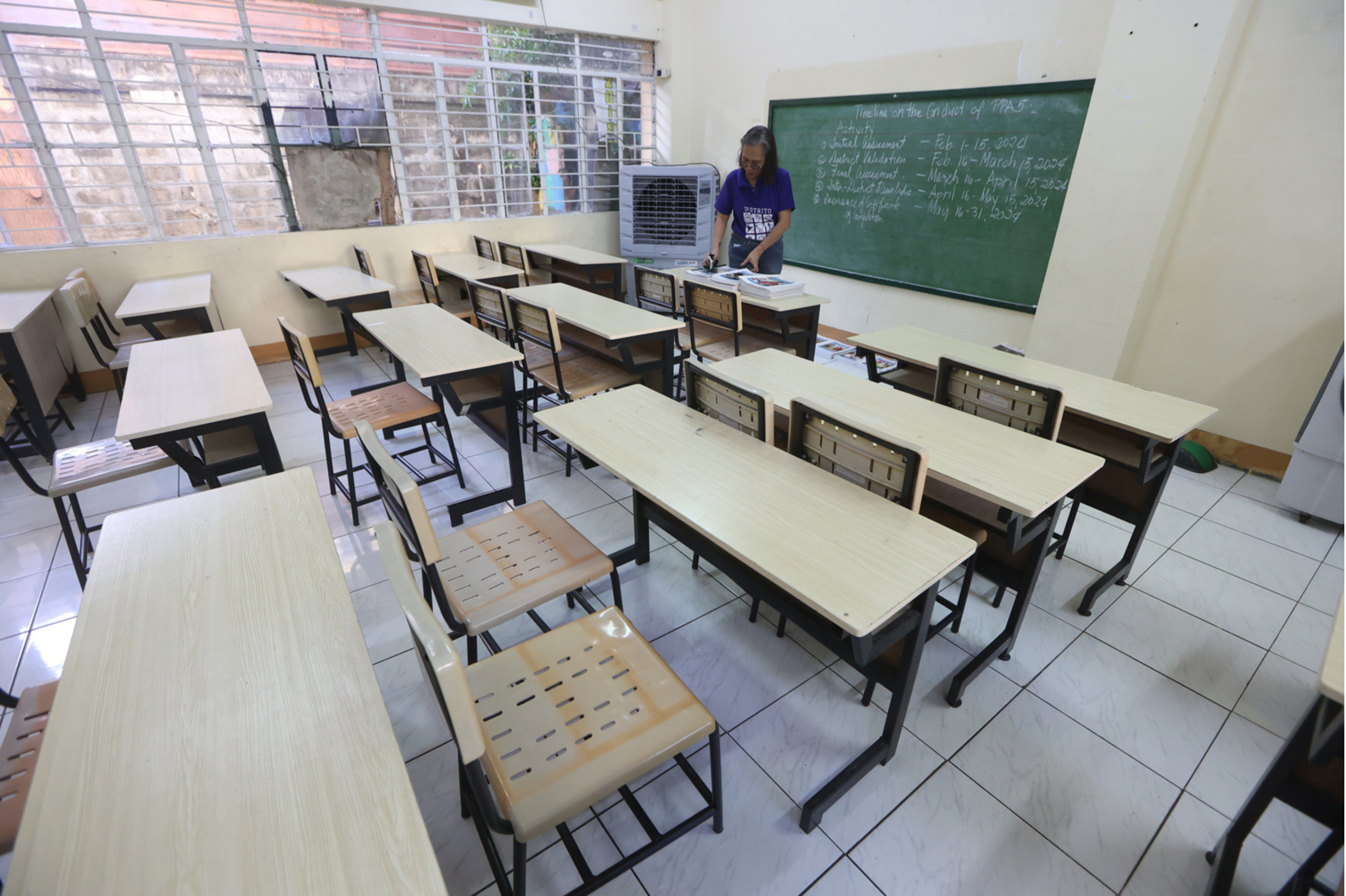
BACK TO REMOTE LEARNING Sylvia Aquino, Alternative Learning System teacher and Grade
4 adviser, checks school materials at Pinyahan Elementary School in Quezon City on Tuesday, April 2
as the city government recommends the suspension, beginning that day, of in-person classes
and return to alternative modes of learning. NIÑO JESUS ORBETA
MANILA, Philippines — Education officials said hundreds of schools in the country, including dozens in the national capital region, suspended classes or adjusted them to online learning, amid the intense heat attributed to the El Niño phenomenon.
The Philippine Atmospheric, Geophysical and Astronomical Services Administration (Pagasa) has been forecasting the heat index, or what it calls the “human discomfort index,” in various parts of the country since the Holy Week holidays, after the indicator began to reach the “extreme caution” to “danger” levels.
READ: Pagasa: Metro Manila, 15 other areas to have ‘danger-level’ heat index
READ: Easter Sunday heat index to reach 42°C-44°C in 8 areas
The weather bureau’s classification for the heat index is as follows: 27 degrees Celsius to 32ºC (caution); 33ºC to 41ºC (extreme caution); 42ºC to 51ºC (danger); and 52ºC and beyond (extreme danger).
Since the Lenten break, Pagasa has recorded a heat index of 41ºC to 44ºC in Metro Manila, Cagayan Valley, Bicol, Western Visayas and the Soccsksargen region, among other areas. In Metro Manila, primary and secondary schools in Quezon City were ordered closed while schools in other areas were given the option by local officials to shift to remote learning.
Some schools in the capital of Manila shortened class hours to avoid the hottest part of the day.
‘To ensure continuity’
On Monday, the provincial government of Sultan Kudarat in Soccsksargen suspended all in-person classes in both public and private schools until April 15.
“Alternative modes of learning and teaching may be implemented to ensure continuity of education while face-to-face classes are suspended,” Vice Gov. Raden Sakaluran said in his Executive Order No. 70 which he issued as acting governor.
On Tuesday, General Santos City Mayor Lorelie Pacquiao suspended classes for three days or up to Friday. She also asked school authorities to use alternative modes of teaching for the meantime.
Classes in hundreds of schools in other parts of southern Mindanao were shortened to avoid the hottest part of the day.
Albay, Olongapo
In Luzon, some mayors in Albay province advised school officials to adjust between in-person and online classes.
Camalig Mayor Carlos Irwin Baldo Jr. and Polangui Mayor Raymond Adrian Salceda said schools may conduct in-person classes in the morning and shift to other modes for the afternoon classes.
Mayors Paul Garcia and Wilfredo Maronilla of Guinobatan and Libon, respectively, directed all public and private schools to shift to modular or online learning.
In Olongapo City, the Basic Education Department of St. Joseph College will limit in-person classes to the mornings starting Wednesday.
Fr. Raymann Catindig, school president, said afternoon in-person classes will be in blended modes of learning. But faculty members are still required to be present in school, regardless of the class mode, he said.
Authorized by DepEd
The heat index in this city was at 39ºC on Tuesday and is expected to reach 40ºC on Wednesday.
Education Assistant Secretary Francis Bringas said in March that schools are authorized by the Department of Education (DepEd) to make adjustments in the conduct of classes since the intense heat may prevail until May.
Under DepEd’s Department Order No. 37, work and classes in private and public schools may be canceled to “minimize the health and safety risks brought about by disasters and other natural calamities.”
This authorization should prompt schools to revert to online classes for the time being, senators said.
“Nothing is barring local government units and school heads from switching back to blended or distance learning due to the scorching weather we’ve been experiencing now,” Sen. Jinggoy Estrada told reporters.
Ensure 24/7 water supply
Sen. Sherwin Gatchalian, chair of the Senate basic education committee, agreed, saying: “We want to remind the school principals that if the safety of our students is at risk, they may implement blended learning in schools.”
Sen. Grace Poe called on Maynilad Water Services Inc. and Manila Water Co. Inc. to coordinate with the Metropolitan Waterworks and Sewerage System and the National Water Resources Board to prevent water interruptions.
“Water providers must ensure an uninterrupted, 24/7 supply,” said the chair of the Senate committee on public services.
“The heat is on, water is on high demand, and without it, our health is at risk,” Poe said.
The Alliance of Concerned Teachers (ACT) emphasized once again the need for proper ventilation in classrooms, even as it also pointed out the hazards of overused appliances.
ACT chair Vladimer Quetua cited a recent fire in Cebu City’s Abellana National High School caused by an overheated wall fan.
“It’s not impossible for an electric fan to overheat. Teachers and students are already suffering from classroom shortage and yet there’s another burden of our classrooms lacking proper ventilation,” he said. REPORTS FROM AFP, EDWIN O. FERNANDEZ, MA. APRIL MIER-MANJARES, DELFIN T. MALLARI JR., KEZIA SHANE REYES, JOANNA ROSE AGLIBOT, MARLON RAMOS AND DEMPSEY REYES INQ